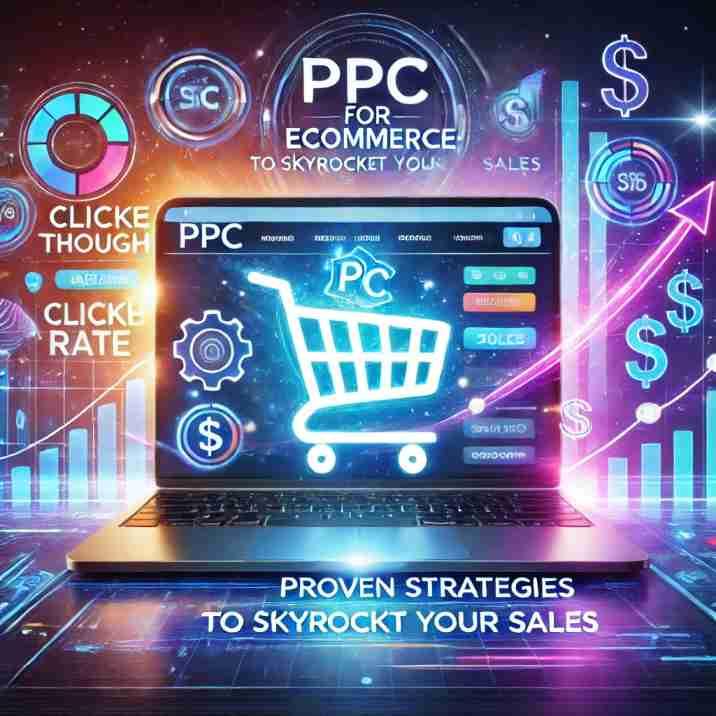-
Feed de Notícias
- EXPLORAR
-
Páginas
-
Grupos
-
Eventos
-
Blogs
Ecommerce PPC Services vs DIY: Which Grows Your Store Faster?

Running an online store in today’s hyper-competitive digital landscape isn’t for the faint-hearted. As more businesses flood platforms like Google, Amazon, and Meta to reach buyers, the need for a robust, efficient advertising strategy becomes unavoidable. That’s where ecommerce PPC (Pay-Per-Click) comes in. It’s a powerful traffic and sales driver—but one important question often arises: should you do it yourself, or hire professional ecommerce PPC services?
Let’s break down the pros, cons, and outcomes of both approaches to determine which helps grow your ecommerce business faster.
Understanding Ecommerce PPC: The Foundation of Growth
Before comparing DIY and professional help, it’s important to understand what ppc for ecommerce really means. Ecommerce PPC is an advertising model where online retailers pay a fee every time someone clicks on their ad. These ads appear on search engines, shopping platforms, and social media networks. The ultimate goal? Attract more traffic, increase conversions, and scale revenue.
However, successful PPC is not just about launching ads. It involves deep audience targeting, smart bidding strategies, ad copywriting, conversion tracking, A/B testing, and performance analytics. This is where many DIY marketers stumble.
DIY Ecommerce PPC: Freedom with a Learning Curve
Choosing to manage your own PPC campaigns can feel empowering. You maintain full control, make decisions based on your vision, and save money on agency fees. With platforms like Google Ads and Meta Ads Manager offering accessible interfaces, the idea of handling PPC alone seems plausible.
But here’s the catch: ecommerce PPC management is complex and time-consuming. Understanding the nuances of audience segmentation, keyword bidding, negative keywords, ad extensions, product feeds, and attribution models demands both time and expertise. While learning is possible, the time invested often eats into core business functions like inventory management, customer service, and logistics.
Additionally, without real-time insights and advanced tools used by an ecommerce PPC agency, many DIY campaigns waste budget due to inefficient targeting, low-performing keywords, or poor conversion tracking.
Hiring Ecommerce PPC Services: Smart Leverage for Faster Growth
Professional ecommerce PPC services exist for a reason they deliver results faster. Partnering with an ecommerce PPC company brings specialized knowledge, refined strategies, and access to advanced tools that streamline your ad performance. Agencies have seasoned PPC experts who know how to handle campaign scaling, optimize ROAS (Return on Ad Spend), and avoid budget bleed.
They also understand the nuances of each platform—what works on Google Shopping may not work on Amazon Ads or Meta. With an ecommerce PPC agency, you also benefit from consistent A/B testing, deep data analysis, creative ad copy, retargeting strategies, and smart budget allocation.
This kind of professional management accelerates store growth by ensuring that every dollar spent brings in maximum ROI. Plus, as your campaigns scale, agencies can adjust strategy fast—something DIYers often take weeks or months to learn.
Cost vs. ROI: DIY vs Ecommerce PPC Company
A major reason store owners lean toward DIY PPC is cost savings. On the surface, not paying an agency seems budget-friendly. But in the long term, inefficient campaigns can bleed your budget without delivering results.
An ecommerce PPC company, on the other hand, charges a fee or a percentage of ad spend. Yet, they also ensure your campaigns are fully optimized, which typically leads to better performance. In many cases, the extra spend is outweighed by higher returns, better CTRs (click-through rates), and lower CPCs (cost per click). That’s the real value of outsourcing.
Speed of Growth: The Ultimate Question
So which option really grows your store faster?
If you’re new to PPC, lack the time to learn advanced strategies, or are already juggling multiple roles in your business, hiring an ecommerce PPC agency is almost always the faster route. They bring tested frameworks, tools, and experience that accelerate ad performance and scale growth quickly.
However, if you’re experienced in digital marketing, have time to experiment, and want full control over your campaigns, DIY PPC might work—though it will likely take longer to see substantial results.
Scalability and Long-Term Success
Growth isn’t just about quick wins. It’s about creating scalable systems that keep delivering long after the initial boost. DIYers often struggle to maintain performance at scale, especially as budgets and product catalogs grow. Managing hundreds of ad groups, product feeds, and keyword sets manually becomes overwhelming.
Ecommerce PPC management companies are built for this. They use automation tools, real-time dashboards, and dedicated analysts to ensure that your campaigns scale efficiently without dropping performance. This makes agencies a more reliable long-term growth partner.
When DIY Makes Sense
To be fair, there are cases where managing PPC yourself can make sense. If your budget is minimal, or you’re just starting out and want to learn the ropes before outsourcing, DIY can be a great learning phase. Some store owners even begin with DIY and then hand off to an agency once they hit a plateau or can no longer scale efficiently.
Just keep in mind: the faster you want to grow, the more you’ll need help from professionals.
Conclusion: Making the Right Move for Growth
There’s no one-size-fits-all answer, but if your goal is to grow faster, smarter, and more profitably, working with a reputable ecommerce PPC agency is often the most strategic move. While DIY gives you control, it also comes with delays, learning curves, and potential missteps.
An expert ecommerce PPC company brings the tools, data, and skill to not only launch effective campaigns but also scale them sustainably. The faster you delegate, the sooner you can focus on what really matters—growing your brand, building customer loyalty, and expanding your market reach.
- Art
- Causes
- Crafts
- Dance
- Drinks
- Film
- Fitness
- Food
- Jogos
- Gardening
- Health
- Início
- Literature
- Music
- Networking
- Outro
- Party
- Religion
- Shopping
- Sports
- Theater
- Wellness


